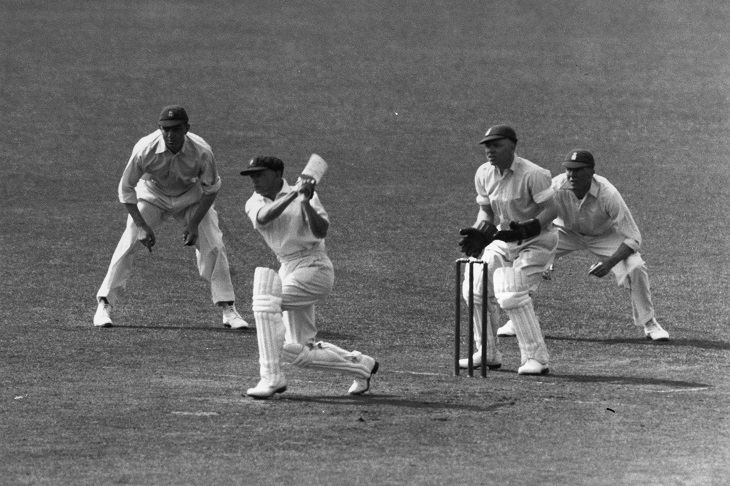It is increasingly common for professional sportsmen and women to express political opinions, particularly in the age of Twitter. Most are trite, orchestrated clickbait bites aimed at achieving headlines in mainstream media and stoking the fires of the trendy culture wars. This phenomenon, usually played out by those who chase balls and endorse footwear for a living, sometimes involves athletes uttering something that proverbially touches the third rail and causes at least one-half of the political spectrum to experience seizures. Think the likes of Nick Kyrgios.
However, the particular case we wish to address is an altogether different political expression from a very different epoch. It is a measured, thoughtful, expression of opinion by a national icon. In 1975, Sir Donald Bradman wrote a letter to then-new Liberal Party Prime Minister Malcolm Fraser, in the aftermath of the Double Dissolution Election that ended Gough Whitlam’s Labor Party government. In this now bizarrely infamous letter, recently discovered by Federation University’s Verity Arche, Bradman advised Fraser to restrain inflation, to reform the Trade Practices Act, to protect the right of non-Union members to work, and to oppose the media’s reflexive characterisation of profits as obscene or illegitimate.
Naturally, the Australian Left had a meltdown. Twitter was replete with posts describing Sir Donald Bradman as an ‘RWNJ’ – a Right Wing Nut Job. Clearly Sir Donald’s actual opinions are rather inconvenient to the Australian Left’s ideal of Australian national identity being predicated on a socialist interpretation of ‘mateship’ and solidarity. As such, Sir Donald’s image is being pilloried and one wonders how long it will be before his statues are defaced by gangs of black-clad vegan soy-macchiato-swilling Grievance Studies students.
Let it be clear that zero of Sir Donald’s views count as ‘nut job’ in any way. To cancel Bradman for these beliefs is to cancel him for believing things that most economists will defend to at least some degree. In order:
‘The great enemy today is inflation which, if not brought under control and quickly, will ruin our economy… a way must be found to preserve the purchasing power of money… because otherwise savings, life assurance, superannuation and such like gradually become meaningless’ – Bradman, 1975
Bradman’s understanding of inflation here is correct. Inflation is ruinous to an economic system, as shown by the hyperinflationary and stagflationary episodes of the 20th century. The misery that inflation inflicts upon people is hard to overstate, particularly for the poor. The poor, unlike the rich, lack diversified asset holdings, and spend larger proportions of their income on consumption goods – this makes them particularly vulnerable to the impact of inflation. This is why inflation is one-half of what economists call the ‘Misery Index’ (the sum total of the percentage CPI inflation rate and the percentage unemployment rate). Inflation is ultimately a wealth transfer from cash-holders and savers to cash issuers (i.e., central banks and Big Finance), and has a strongly regressive impact.
Indeed, ‘inflation is particularly ruinous and must be kept low’ has been considered economic orthodoxy from the 80s onwards, and still is. Mainstream discourse has basically accepted this point, although that acceptance suddenly vanished this year because various American pundits wanted to make excuses for the high inflation rate under Joe Biden’s Administration. One may speculate that this, ultimately, is why concern for inflation has now gone from broadly accepted orthodoxy to ‘Right Wing Nut Job’ territory – it makes the Democratic Party look bad. It seems this new attitude has caught the eye of the economically illiterate Australian Left.
‘What the people need are clearly defined rules which they can read and understand so that they can get on with their affairs. The Statutes Book is currently a nightmare for business, with the Trades Practises Act (sic) one of the worst in that even those administering the act admit they don’t know what is and is not legal.’ – Bradman, 1975
Bradman’s sentiments here are completely unobjectionable. The importance of clear and comprehensible laws is self-explanatory and is a key component of the Rule Of Law. People, whether in their personal or commercial lives, are greatly impeded in their decision-making when legal and regulatory uncertainty or ambiguity exists. The only people who benefit from this uncertainty or ambiguity are lawyers who are paid to fight over it or bureaucrats who want to leverage it into corruption opportunities.
This is, and should be, a completely non-ideological issue. ‘We should have as much clarity and consistency in law and regulation as possible’, is not a left-wing or right-wing stance – everyone should support it. If the Trade Practices Act is so badly written and hard to interpret that even those administering the act cannot determine what is or is not legal, we are clearly dealing with a law that needs substantial reform. This is true for any act, whatever it addresses.
‘I hope also your Government will be able to protect “freedom to work”. In society where men are compelled to lose employment unless they are unionists…, where they are prevented from entering premises where they want to work by a handful of “pickets”, there is something radically wrong.’ – Bradman, 1975
Bradman’s position here is simple – a worker should not have to join a union in order to be able to find employment. Bradman is not suggesting unions should be illegal or that they do not have a place in the economy, he is merely saying joining one should not be mandatory. This is a simple matter of freedom of association – the freedom to associate (such as through joining a union) implies the freedom to choose not to associate (through declining to join a union).
But let us place Bradman’s comments in context. Union power reached an apogee during the Whitlam years and ‘closed shop’ labour arrangements (situations where employees of a particular firm or in a particular industry had to be part of a specific union) were common. The unions which workers were required to join (and which businesses were required to bargain with) were the unions of the Australian Labor Party and thus workers were required to pay union dues that were used to support the ALP’s political campaigns. In other words, workers were widely compelled to furnish contributions of money for the propagation of opinions that they may not have shared – something which Thomas Jefferson characterised as ‘sinful and tyrannical’.
Notwithstanding the troubling aspects of widespread government-mandated closed shop unionism for both free speech and free association, most Australians with memories of the time don’t fondly recall the impact that extreme union power had on the Australian economy. This state of affairs was exceptionally inefficient and strike-prone, to the point where it was mostly abolished or moderated under the governments of Bob Hawke and Paul Keating. As Daniel Brettig wrote in The Sydney Morning Herald, ‘…control over inflation, in conjunction with a wage restraint accord agreed with unions, turned out to be the elixir for Australia’s economy under Hawke and Paul Keating.’ The situation was so inefficient and unsustainable that even the Labor Party recognised it had to change (one does wonder if that is where the UK is currently headed).
‘The way things are presented in the press is most important. I am Chairman of Directors of a Company which had its years result portrayed in the press as a “bonanza”. I felt constrained to rebuke this description by pointing out that less than 7 per cent on funds after all the work, risk, tribulations etc. was hardly a bonanza when Government Bonds would pay us 10 per cent to do nothing. The public must be re-educated to believe that private enterprise is entitled to rewards as long as it obeys fair and reasonable rules laid down by Government.’ – Bradman, 1975
This phrase in particular was seized upon by critics of The Don. It is fair to suggest his use of the terms ‘entitled’ and ‘re-educated’ didn’t do wonders for his tone. But again, even these statements are not outside of mainstream economic thought. Even centrist economists reject the (quite literally) Marxist argument that profit is expropriation – Marxian economics has been refuted thoroughly, right down to its very root premise (the Labor Theory of Value). Despite this, mainstream discourse continues to be suspicious of profit, to the point where it is almost a swear word. Bradman is right in suggesting that the public’s attitude is incorrect.
Whilst it is true that some profits are created dishonestly or immorally (or through corruption or cronyism or the like), profit as such performs an invaluable role in allocating capital – industries experiencing very high profit margins tend to attract new entrants. Those who invent entirely new products that serve people’s needs also tend to make substantial profits – profit is a reward for the useful novel (and indeed, our society values this so much that intellectual property law creates artificial monopolies to increase the reward for creating new things). Even at the ‘Widget Factory’ level of abstraction, profit is good: if the price of all the necessary inputs to create Widgets is x, the market price of Widgets is y, and x is less than y, the resultant profit exists because less-economically-valued inputs were transformed into more-economically-valued outputs.
Again, none of this is esoteric or unorthodox economics. It is the public attitude which regards ‘profit’ as inherently suspect that deviates from reality. There is no such thing as a quantitative threshold above which a profit becomes innately immoral or obscene. The talking heads of the mainstream media, and the attitudes of many everyday people, have been influenced by the Marxist characterization of profit, and Sir Donald Bradman was, and remains, justified in calling this out.
In the final analysis, Sir Donald Bradman is being cancelled for having perfectly justifiable, reasonable opinions on economic policy which are well within mainstream economic thought. His cancellers are economically-illiterate social-science denialists who are grasping at straws to smear the character of a national hero (during cricket season no less!). He is being condemned for the crime of writing a letter to the Prime Minister and receiving a brief-yet-cordial reply (such villainy!).
The late, great, Australian philosopher David Stove comes to mind. While not an economist he was a thinker of the highest rate and a philosopher of, amongst many things, cricket. In his essay Cricket versus Republicanism (1977), he observes that: ‘It [cricket] requires gentlemanliness, and teaches it. This sounds like headmaster’s talk circa 1938. It is, too. It is also true. I have seen cricket make gentlemen out of the most intractable.’ The Don was of course a sporting genius, but also a gent, and an economically intelligent man. The fact the left Twitterati are sullying him is reflective of a very sad and boorish state of affairs. We may still be good at cricket (sorry South Africa) but we have a long way to go culturally and economically. Let’s hope the pendulum swings sometime soon.
Got something to add? Join the discussion and comment below.
Get 10 issues for just $10
Subscribe to The Spectator Australia today for the next 10 magazine issues, plus full online access, for just $10.


























Comments
Don't miss out
Join the conversation with other Spectator Australia readers. Subscribe to leave a comment.
SUBSCRIBEAlready a subscriber? Log in